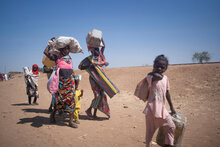European Union Contributes To WFP’s Life-Saving Work In South Sudan
The contribution from the European Commission’s Humanitarian Aid department (ECHO) for WFP South Sudan will provide emergency food and nutrition assistance to about 890,000 people facing hunger as a result of conflict and seasonal food insecurity, including an estimated 165,000 children under the age of five and pregnant and breastfeeding women. WFP is purchasing about 4,000 metric tons of cereals, 500 metric tons of beans, 800 metric tons of oil and 1,000 metric tons of the specialized nutritious food (CSB++) using this donation.
An additional US$ 5.4 million is being provided by the European Commission to support the UN Humanitarian Air Service (UNHAS) and Logistics Cluster, which are managed by WFP on behalf of the humanitarian community to facilitate access to affected people.
“This support is vital to our ongoing efforts to respond to the unprecedented levels of hunger in South Sudan this year,” said Joyce Luma, WFP Representative and Country Director in South Sudan. “The country needs continued international support which, combined with unimpeded access to the affected population, will help prevent the unfolding catastrophe from expanding further.”
South Sudan is experiencing the worst levels of food insecurity since independence with up to 5.5 million people facing severe hunger. In February 2017, famine was declared in parts of former Unity State, in Leer and Mayendit counties, affecting about 100,000 people. However, the timely and adequate provision of humanitarian assistance in recent months has had a positive impact and the food security situation in these areas appears to have improved. The food security situation in the rest of the country, however, has deteriorated further, particularly in parts of Northern and Western Bahr el Ghazal, Upper Nile and Jonglei States, due to continued displacement. Acute malnutrition rates have already reached alarming levels in some areas. This situation will be compounded further during the lean season as families will have run out of their food reserves from the last harvest.
“We are extremely grateful for the generous contribution from the European Commission, which has been consistent in responding to the needs of the most vulnerable people in South Sudan,” Luma added.
In 2016, the European Commission made a contribution of US$ 22.6 million which enabled WFP to provide food assistance to 300,000 internally displaced people hosted in UN Protection of Civilians (PoC) sites and other locations in conflicted-affected areas as well as local people affected by three years of conflict and prolonged food shortages in South Sudan. Besides this, 84,000 young children and 35,000 pregnant and nursing mothers received specialized nutritious food. Furthermore, another US$ 5 million contribution by the European Commission was focused on the UN Humanitarian Air Service (UNHAS) and Logistics Cluster.
Since the start of this year, WFP has provided food and nutrition assistance to 2.8 million people across South Sudan and expects to reach 4.1 million people by the end of the year.
Support from donors including the European Commission, Australia, Brazil, Canada, China, Denmark, Faroe Islands, Finland, Germany, Japan, Lithuania, Netherlands, New Zealand, Norway, Switzerland, the United Kingdom and the United States of America, as well as private donors, has been vital for the response so far. However, WFP urgently needs US$ 139 million to cover its operations for the next six months.
# # #
WFP is the world's largest humanitarian agency fighting hunger worldwide, delivering food assistance in emergencies and working with communities to improve nutrition and build resilience. Each year, WFP assists some 80 million people in around 80 countries.
Follow us on Twitter @wfp_SouthSudan @wfp_media @wfp_africa
For more information please contact (email address: firstname.lastname@wfp.org):
George Fominyen, WFP Juba, mobile +211 922 465 247
Amanda Lawrence-Brown, WFP Nairobi, mobile +254 707 722 105

